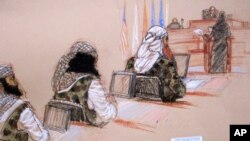The pre-trial hearing of an accused plotter of the September 11, 2001 terrorist attacks on the U.S. has been postponed until Tuesday so that lawyers can consider Walid bin Attash's request to represent himself during his trial.
Attash is among five people at the hearing accused of plotting the September 11th attacks. Military prosecutors say bin Attash served as a bodyguard to al-Qaida leader Osama bin Laden, who was killed by U.S. forces during a raid on his Abbottobad, Pakistan, compound in 2011. Bin Attash is also accused of taking part in the USS Cole bombing in October 2000.
A defendant in a military commission trial has a right to serve as his own lawyer but must be informed of the consequences of doing so. Also, the judge in the case must be certain that the choice to do so is voluntary and made in sound mind.
Attash’s lawyer, Cheryl Borman, said her client has refused to meet with her recently and “believes he is still subject to torture,” according to Miami Herald reporter Carol Rosenburg, one of the reporters at Guantanamo Bay.
Motion topics
Expected to be included in this week’s hearing is a motion to grant the defense counsel access to the buildings in which the alleged plotters may have been confined during interrogations. There will also be an “emergency defense motion” to stop the use of sounds and vibrations to interfere with the confinement of alleged 9/11 plotter Ramzi bin al-Shibh.
The issue of alleged torture has permeated the military hearings, with officials admitting to waterboarding and force-feeding inmates.
The judge will also decide on a request by Khalid Shaikh Mohammad, the alleged architect of the 9/11 terror plot, to send a letter to President Barack Obama. It is unclear what Mohammad wants to say in the letter.
Mohammed was captured in the Pakistani city of Rawalpindi, just outside of Islamabad, in March 2003.
While in U.S. custody in a naval facility at Guantanamo Bay, Cuba, Mohammed confessed to masterminding the 9/11 attacks, the 1993 World Trade Center bombing and other crimes.
He was charged with war crimes and murder in 2008 by a U.S. military commission and, if convicted, could face the death penalty.
A former military prosecutor has criticized the proceedings, saying confessions at the naval base were given under torture.




